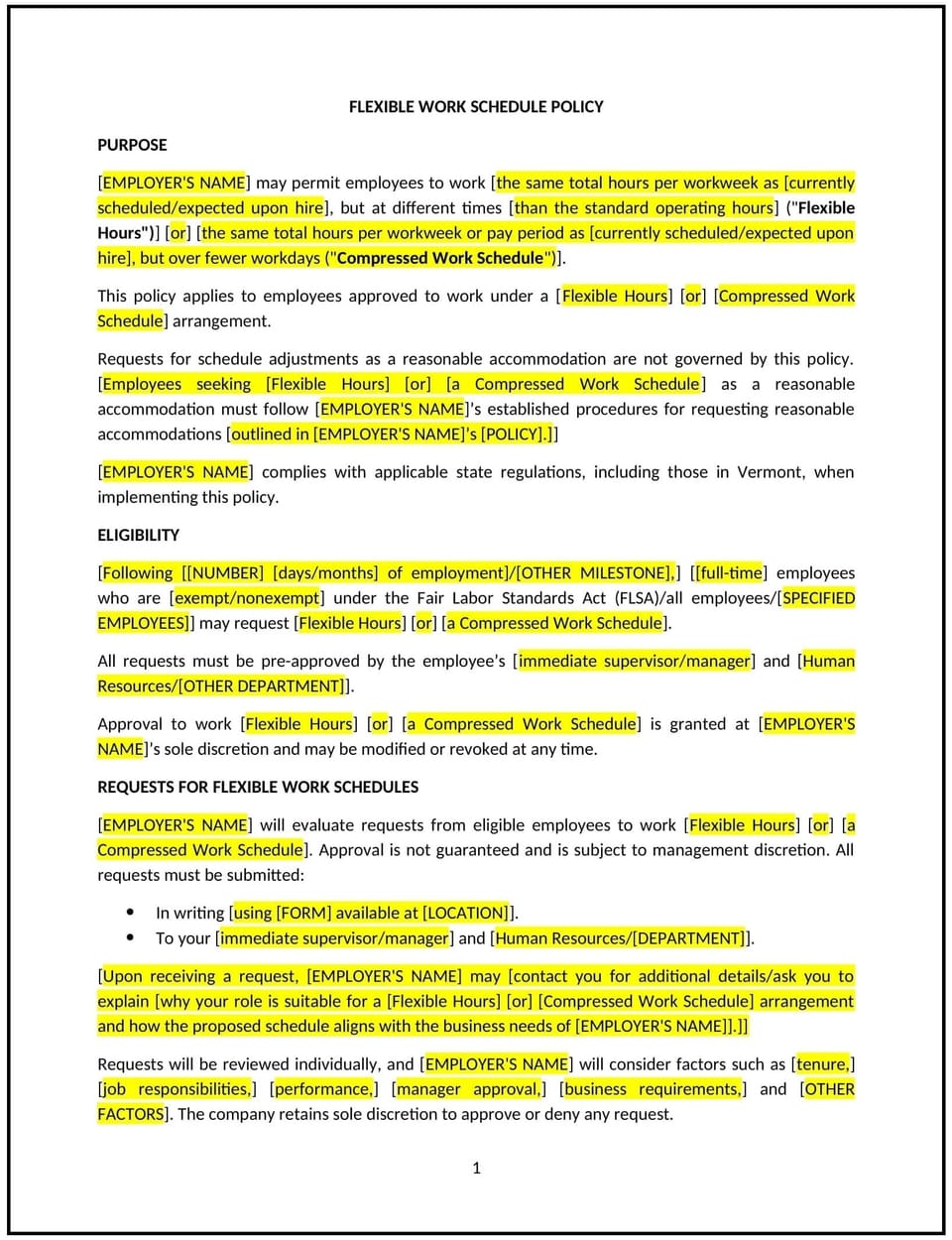Flexible work schedule policy (Vermont): Free template

Flexible work schedule policy (Vermont)
This flexible work schedule policy is designed to help Vermont businesses support employee work-life balance by offering alternative scheduling options. It outlines guidelines for requesting, implementing, and managing flexible work arrangements while ensuring alignment with Vermont labor laws and business needs.
By adopting this policy, businesses can enhance employee satisfaction, improve productivity, and accommodate diverse work preferences.
How to use this flexible work schedule policy (Vermont)
- Define flexible work options: Specify the types of arrangements available, such as flextime, compressed workweeks, remote work, or adjusted start and end times.
- Outline eligibility criteria: Clarify which roles or employees qualify for flexible schedules based on job responsibilities, performance, and business requirements.
- Include request procedures: Provide steps for employees to request flexible schedules, including documentation of the proposed arrangement and its benefits.
- Address approval processes: Detail how requests will be evaluated, including input from managers and HR, and the timeline for decisions.
- Establish performance expectations: Emphasize that flexible work arrangements must not compromise productivity, quality, or collaboration.
- Include trial periods: Allow for trial periods to assess the effectiveness of the arrangement and make necessary adjustments.
- Monitor compliance: Regularly review flexible work arrangements to ensure they align with Vermont laws and organizational objectives.
Benefits of using this flexible work schedule policy (Vermont)
This policy provides several benefits for Vermont businesses:
- Supports employee well-being: Promotes work-life balance, reducing stress and enhancing morale.
- Increases productivity: Allows employees to work during their most productive hours, improving efficiency.
- Attracts talent: Appeals to job candidates seeking flexible scheduling options.
- Promotes inclusivity: Accommodates diverse employee needs, such as caregiving responsibilities or medical conditions.
- Aligns with compliance: Promotes adherence to Vermont labor laws and workplace standards.
Tips for using this flexible work schedule policy (Vermont)
- Communicate the policy: Share the policy with employees during onboarding and include it in the employee handbook or internal systems.
- Train managers: Provide training on evaluating and managing flexible work arrangements fairly and effectively.
- Use technology: Implement tools to track attendance, performance, and communication for remote or flexible employees.
- Encourage feedback: Solicit input from employees and managers to improve the policy and its implementation.
- Update regularly: Revise the policy to reflect changes in Vermont laws, workplace dynamics, or employee needs.
Q: What types of flexible work schedules are available under this policy?
A: Options may include flextime, compressed workweeks, remote work, or adjusted start and end times, depending on job roles and business needs.
Q: Who is eligible for a flexible work schedule?
A: Eligibility is based on job responsibilities, performance, and the operational needs of the business, as determined by managers and HR.
Q: How can employees request a flexible work schedule?
A: Employees must submit a written request to their manager or HR, detailing the proposed schedule and how it supports their role and the company’s objectives.
Q: Are flexible work arrangements permanent?
A: Flexible arrangements may include trial periods to evaluate their effectiveness and can be adjusted or revoked based on performance or business needs.
Q: How is performance monitored for employees with flexible schedules?
A: Performance is evaluated based on productivity, quality of work, and adherence to deadlines, using tools and regular check-ins.
Q: Can flexible work schedules be denied?
A: Yes, requests may be denied if the proposed schedule conflicts with business needs, role requirements, or employee performance expectations.
Q: How often is this policy reviewed?
A: This policy is reviewed annually or whenever significant changes occur in Vermont laws or workplace practices.
Q: Does this policy apply to all employees?
A: This policy applies to eligible employees whose roles and responsibilities align with the requirements for flexible work arrangements.
This article contains general legal information and does not contain legal advice. Cobrief is not a law firm or a substitute for an attorney or law firm. The law is complex and changes often. For legal advice, please ask a lawyer.


